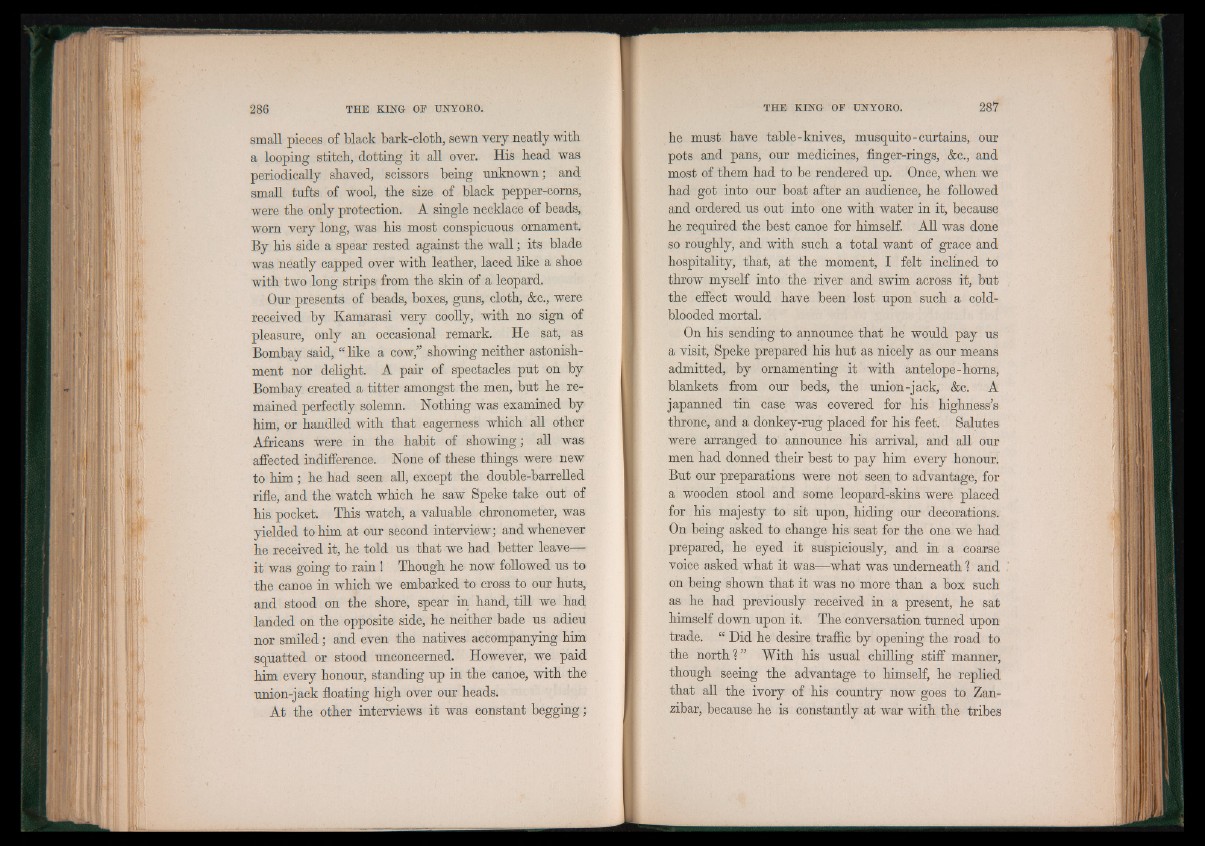
R m a .1 1 pieces of black bark-cloth, sewn very neatly witb
a looping stitch, dotting it all over. His head was
periodically shaved, scissors being unknown; and
small tufts of wool, the size of black pepper-coms,
were the only protection. A single necklace of beads,
worn very long, was his most conspicuous ornament.
By his side a spear rested against the wall; its blade
was neatly capped over with leather, laced like a shoe
with two long strips from the skin of a leopard.
Our presents of beads, boxes, guns, cloth, &c., were
received by Kamarasi very coolly, with no sign of
pleasure, only an occasional remark. He sat, as
Bombay said, “ like a cow,” showing neither astonishment
nor delight. A pair of spectacles put on by
Bombay created a titter amongst the men, but he remained
perfectly solemn. Nothing was examined by
him, or handled with that eagerness which all other
Africans were in the habit of showing; all was
affected indifference. None of these things were new
to him ; he had seen all, except the double-barrelled
rifle, and the watch which he saw Speke take out of
his pocket. This watch, a valuable chronometer, was
yielded to him at our second interview; and whenever
he received it, he told us that we had better leave—
it was going to rain ! Though he now followed us to
the canoe in which we embarked to cross to our huts,
and stood on the shore, spear in hand, till we had
landed on the opposite side, he neither bade us adieu
nor smiled; and even the natives accompanying him
squatted or stood unconcerned. However, we paid
him every honour, standing up in the canoe, with the
union-jack floating high over our heads.
At the other interviews it was constant begging;
he must have table-knives, musquito-curtains, our
pots and pans, our medicines, finger-rings, &c., and
most of them had to be rendered up. Once, when we
had got into our boat after an audience, he followed
and ordered us out into one with water in it, because
he required the best canoe for himself. All was done
so roughly, and with such a total want of grace and
hospitality, that, at the moment, I felt inclined to
throw myself into the river and swim across it, but
the effect would have been lost upon such a coldblooded
mortal.
On his sending to announce that he would pay us
a visit, Speke prepared his hut as nicely as our means
admitted, by ornamenting it with antelope-horns,
blankets from our beds, the union-jack, &c. A
japanned tin case was covered for his highness’s
throne, and a donkey-rug placed for his feet. Salutes
were arranged to announce his arrival, and all our
men had donned their best to pay him every honour.
But our preparations were not seen to advantage, for
a wooden stool and some leopard-skins were placed
for his majesty to sit upon, hiding our decorations.
On being asked to change his seat for the one we had
prepared, he eyed it suspiciously, and in a coarse
voice asked what it was—what was underneath I and
on being shown that it was no more than a box such
as he had previously received in a present, he sat
himself down upon it. The conversation turned upon
trade. “ Did he desire traffic by opening the road to
the north?” With his usual chilling stiff manner,
though seeing the advantage to himself, he replied
that all the ivory of his country now goes to Zanzibar,
because he is constantly at war with the tribes